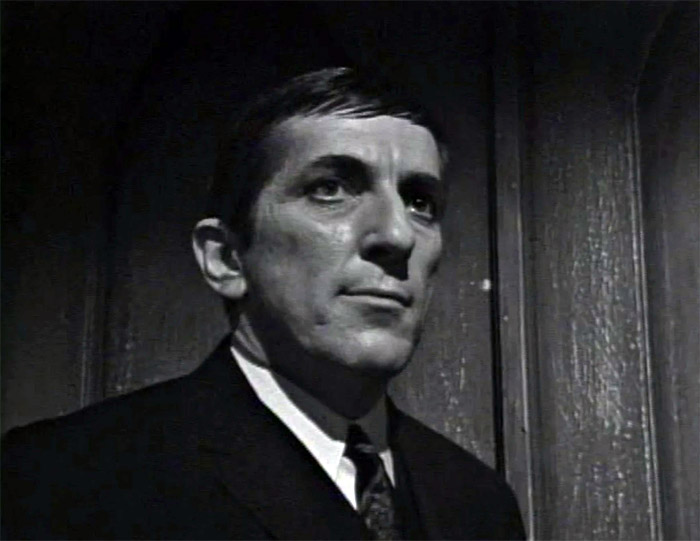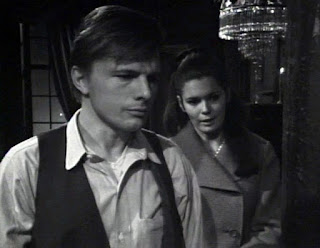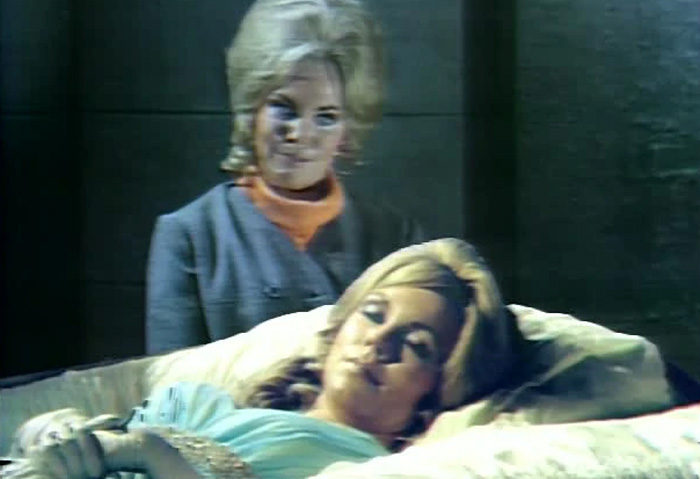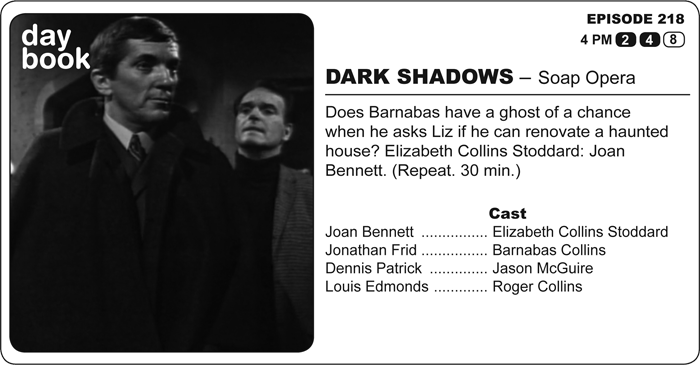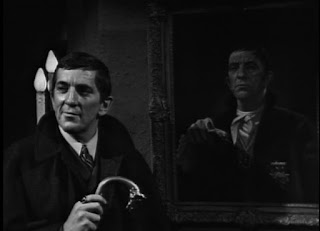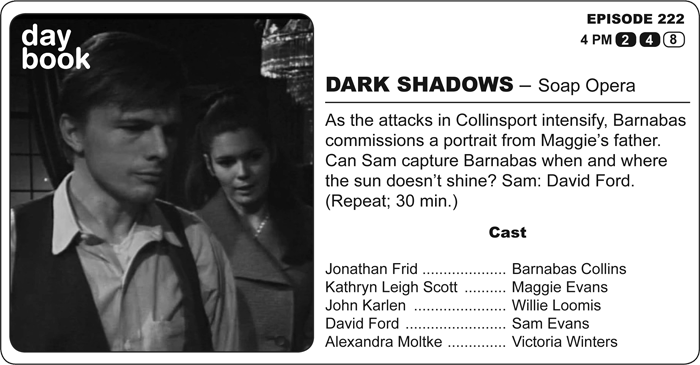By PATRICK McCRAY
Taped on this day in 1967: Episode 222
With nothing to lose but his inhibitions, Barnabas explores the wild world of male modeling to win Maggie’s heart. Barnabas: Jonathan Frid. (Repeat; 30 min.)
Barnabas, eager to have Maggie in his home, asks Sam Evans to paint his portrait. Probably also so he knows what he looks like. Sam agrees, and the two men start working late at night.
Barnabas awakens to find himself in a new world of gods and coincidences, although I suspect he’s wishing that Maggie’s dad were a contractor, given the state of the Old House wallpaper. The coincidence leads to one of Dark Shadows’ classic moments and raises questions about practicalities, as well.
Critics of the show would be hard-pressed to cite this with the usual cavils of chintz and camp. It’s spare and elegant, with Jonathan Frid delivering a performance that’s somewhere between little-boy-lost and utterly sinister. His chemistry extends to the entire cast, and the result is an unusually tight episode. It has an ending we all see coming, but is still redolent with mystery and implication. Sam insists on finishing a final detail on Barnabas’ portrait as the sun begins to rise. As he finishes, Barnabas has escaped, impossibly.
That’s the moment, and we enjoy it three ways. Even a new viewer is Barnabas’ secret confidant, knowing what Collinsport doesn’t. But we don’t know everything, including what he’s up to or how far this will go. And at the same time, we’re seeing Sam’s model vanish from his point of view, and can enjoy the eerie mystery, and wonder if either artist or model will return the next night.
As schemes go, this whole painting business is yet another moment that makes Dark Shadows the most poker-faced sitcom on TV. Like a love-struck 14-year-old, Barnabas comes up with every scheme possible to “just accidentally” keep running into Maggie as if he’s getting advice from Ralph Mouth and Potsie. This is right on the heels of the moment where he just-so-happens to leave his cane at the diner (so he has another excuse to see Maggie). In this case, he schemes to have Maggie’s dad paint his portrait under ludicrous circumstances so that he can again be in her company. You call it creepy. I call it adorable. It’s beyond a meet-cute. It’s Barnabas’ wacky concession that it’s a new world. What were his prior courting opportunities? He’s exhausted himself looking for a good cotillion or public hanging, and with those surefire heart-melters gone, he has no choice but to resort to schemes. I think such Puckish madness is the only reason WIllie puts up with him. Well, that and the threat of constant beatings. The comical highlight of the episode may be when Barnabas and Sam are awkwardly negotiating on a price, and Barnabas offers to pony up a grand. That’s well north of $6000 in 2020 money. But when was the last time Barnabas commissioned a portrait of himself? The last thing he paid an artist was probably three casks of rum and the promise to keep Ben Stokes off the lawn. Come to think of it, Sam probably would have gone for that, too, and never mind that he’s never heard of Ben Stokes. Barnabas is not exactly in his element here. Locked in a coffin since the Washington administration. Resorting to feeding off Willie. Living a renovation nightmare. Can’t find a good jabot at Brewster’s. And then there’s your ex-fiance. I mean, right there. So, how cool can he be? If he tried to play it smooth, he’d wind up looking like Sinatra in the love beads when he Did His Thing with the Fifth Dimension. And no one wants that.
Except for me.
In the best scene of the episode, the irony train roars through the Collinwood foyer at full blast. Maggie comes by to report to Vicki that Barnabas might as well be converting the Old House into an artist’s colony with impassioned and demonstrative treatises on naturism inevitably to follow after the fifth round of claret cups. Before they can call Sheriff Patterson to join in, Vicki introduces Maggie to the portrait, and Maggie is the one person who doesn’t bother with noting Barnabas’ resemblance, probably because she’s seen the last few episodes. Instead, she notes the eyes, and both women admit that it’s a relief to finally have someone pleasant around Collinwood. Liz? Roger? Are you listening? I’m not here to tell Mrs. Johnson that she’d get bigger tips if she’d smile more, although I have no doubt Burke said that once or twice after his fifth Tanqueray & Tang, but, you know, it might make breakfast a tad less funereal.
In seriousness, it’s a marvelously true and beautiful moment. They can sense it in him. Even though the audience is supposed to chuckle at the irony, Yes, we are supposed to think that Barnabas’ innate and radiant kindness is camouflage hiding the Beast. No. So great is his genuine spirit that even Angelique’s curse is eclipsed by it. This is only evident when you know the full story of Barnabas Collins, but it’s about fifty-three years too late for spoilers.
The show inevitably feels foreign when revisited after exploring its full expanse. Quiet. Focused. Affectionate toward its well-drawn characters. It is exactly the tone we need to root us in, and I mean it, the reality of these people. This moody tone poem in black, white, and creamy gray is the real world from which we depart. Knowing that it’s there is what allows us to stay invested into the wildest of futures, pasts, and parallels.
This episode hit the airwaves on May 3, 1967.

